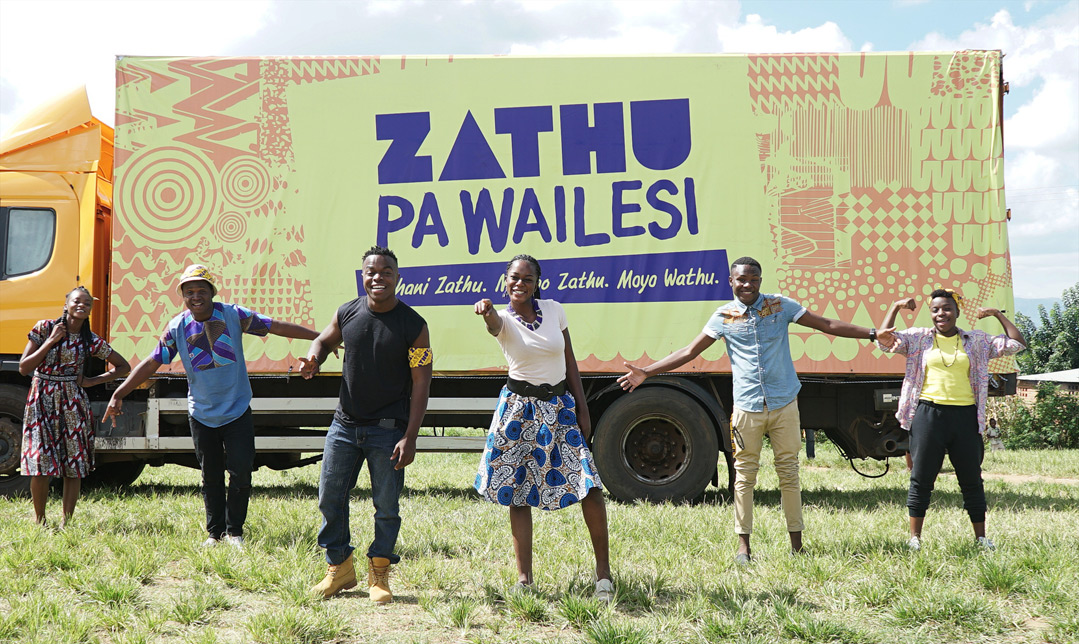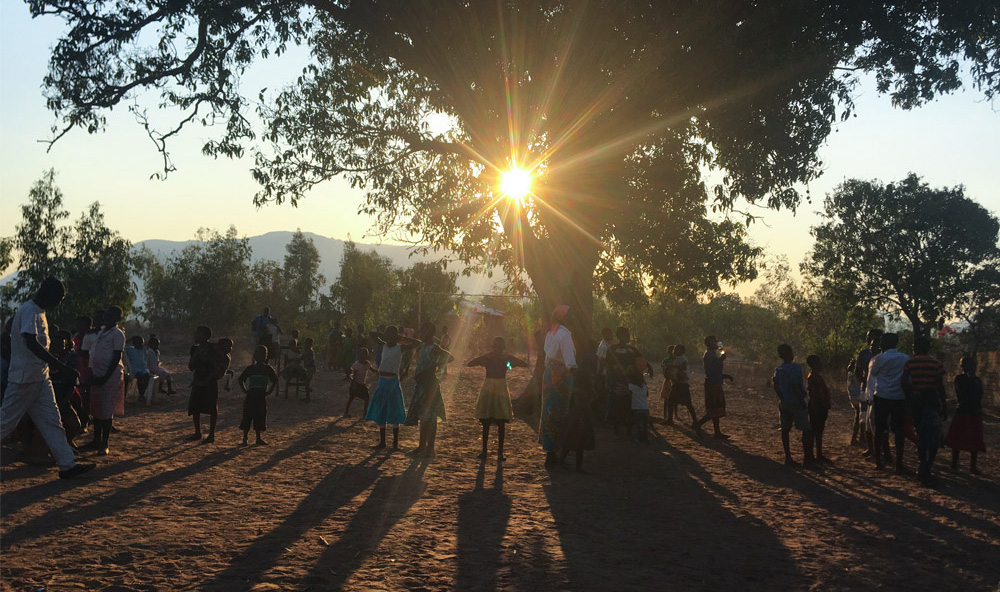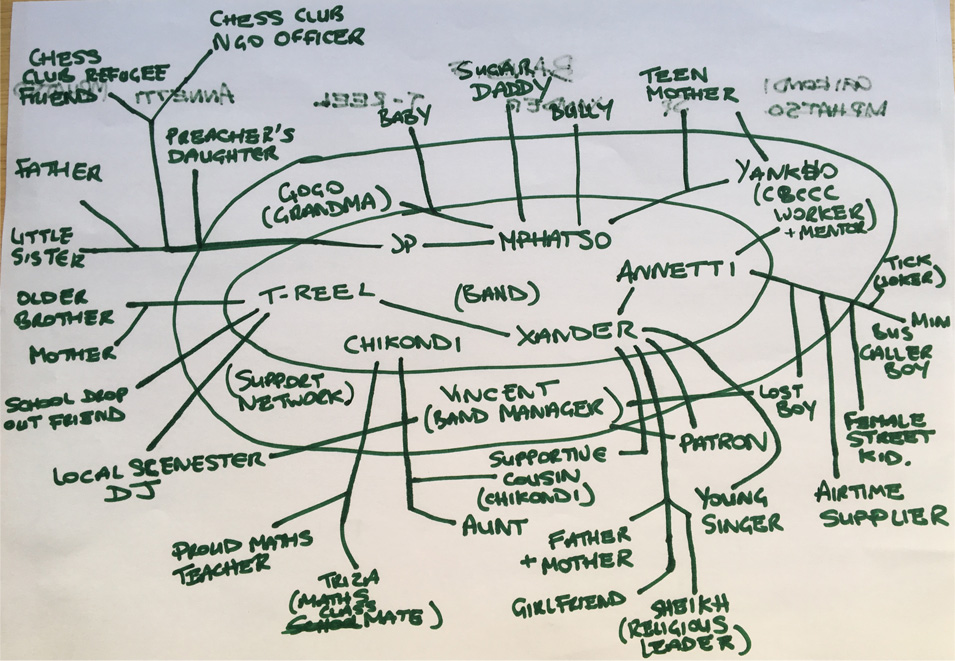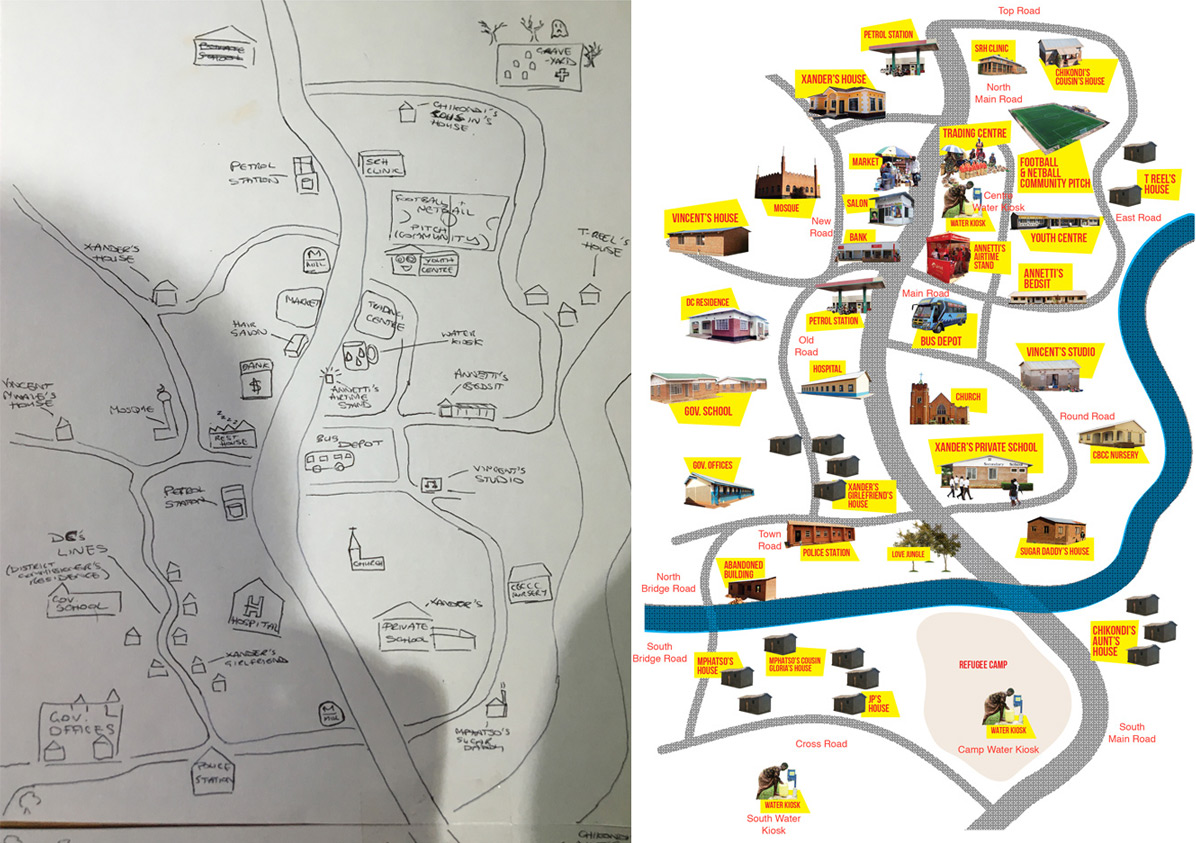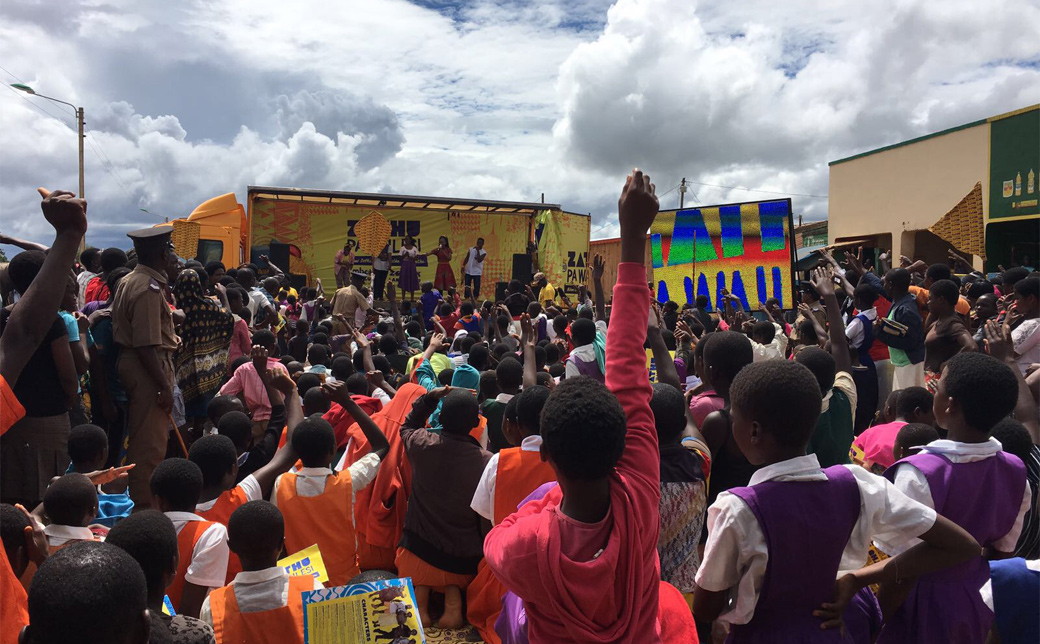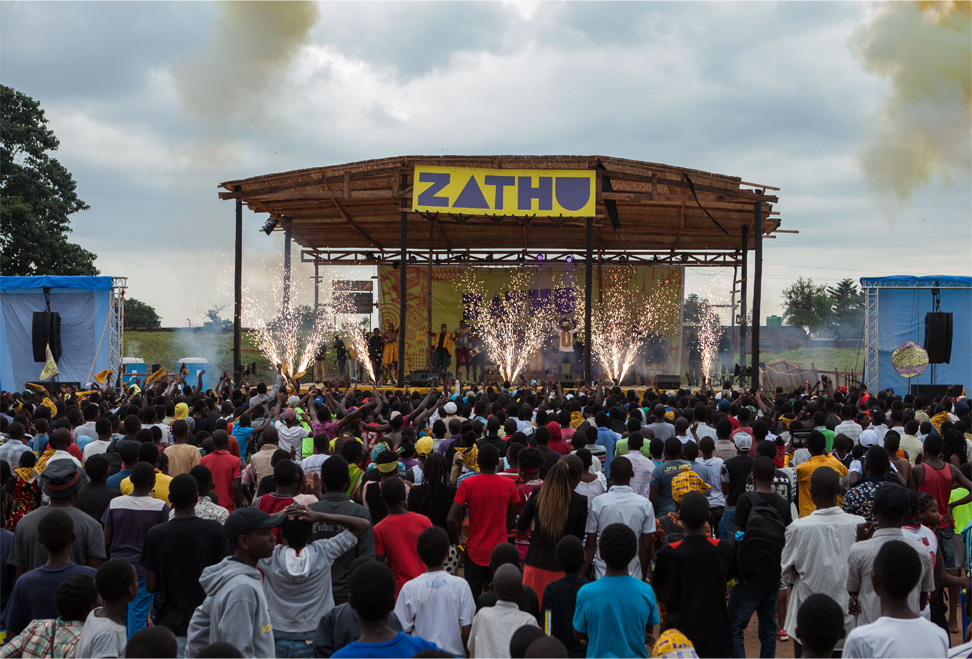Scriptwriting and helping create a Malawian youth brand, in 3 acts.
Prologue
It’s April 2017: You’re riding to Jali in Zomba for Day 2 of the Zathu roadshow. You remembered this morning that you agreed to write a blog post. Your first ever, and your first draft is due tomorrow. Abbie offers to brainstorm and quickly suggests a pretty meta response to your brief (describe the Creative Development of the new Malawian brand’s Characters and Drama). Not needing encouragement to get existential, you thank her but decide against it. She isn’t sure she helped – but she did.
Act 1:
A Beginning (with Characters)
It’s August 2016: A couple of weeks ago, Matt, James and few others, completed what was reported to have been a uniquely rigorous and entertaining interviewing process to handpick the best of Malawi’s talent. With new colleagues and partners on board, everyone was pumped; ready to leap into the unknown and create the country’s biggest ever youth brand.
Now, a week in an old Lilongwe theatre called MADSOC would bring together about 20 people, mostly from Lilongwe and Blantyre with a variety of expertise. We knew a few things going in: we wanted to create content for teenagers; we wanted to show boys and girls working together; and we knew that music would be a big part of this. But aside for a few other must-haves, everything was up for grabs.
A lot of ideas evident in the final product were born that week in MADSOC. The newly formed team worked intensively, often rapidly in small groups to generate ideas for settings, storylines, products, launch events, and characters before sharing and testing them with the wider group. All ideas were welcome, sometimes similar ones emerged spontaneously from different camps, and everyone worked together with each person rotated through different groups on various exercises.
Sometimes groups inherited work others had done the previous day and were tasked with building upon it. Very quickly the team bonded as they overcame dozens of creative challenges, presented their output side-by-side, and pooled their knowledge of Malawian culture to constructively question and strengthen each other’s contributions. It set the tone for much of the work that has since followed.
There were also a series of mini presentations. Levison, who now translates the Zathu drama, recited an old folktale brought to life with voices for different characters. Faith, who masterminds the Zathu music, impressed us by looping sounds, building them into a live piece and enlisting his audience in call and response. And someone from further afield, ahem, was invited to talk a little about storytelling: their rundown highlighted that many people expect stories to have a beginning, middle and end, but this speaker said they believed a good story also struck a balance between Plot, Character, and Theme – with the weighting of each depending on your medium and the effect you want to have on your audience.
From that week at MADSOC came a strong feeling that our core cast would comprise of six teens. But we left the workshop with nine preferred characters. They borrowed from Jungian archetypes with timeless characteristics recognisable the world over. So who would we choose? And would there be more girls than boys? There was a wannabe rapper, a former street kid, an orphan, a teen mother, a rich kid, a refugee. There was also a meek multi-instrumentalist, a straight-A student, and an arrogant alpha male.
In September, co-creation workshops in Lilongwe, Zomba and Rumphi put our nine characters into the hands of teens. Imaginative boys and girls performed role plays, workshopped names for the group, and gave opinions on the nine. When straight-A student Patricia appeared in most line-ups alongside downtrodden orphan Chikondi, we attributed Patricia’s academic enthusiasm to Chikondi. And when T-Reel was chosen almost every time, we gave him the arrogance previously characteristic of a drummer called Gabriel.
Things were moving fast, and it was quickly becoming apparent what the teenagers liked and disliked about the nine characters they were offered. Refugee JP rarely featured in the line-up – one teen in Zomba felt that opportunities for Malawian teens are so rare it wouldn’t be good to give such a chance to a foreigner. And teen mother Mphatso also faced a mixed reception – maybe she would be too busy with her baby to show real commitment to a band. Even though we decided against some teens’ concerns, their rationale often greatly informed our characters’ positioning within the group and the challenges they could face.
In October we set to work on radio drama and comic book prototypes for the brand with a line-up comprised of: riches-to-rags rapper T-Reel, former street kid Annetti, kind-hearted rich kid Xander, studious orphan Chikondi, humorous refugee JP, and determined teen mother Mphatso. Each came with a few supporting characters (including Mphatso’s wise Gogo offering support and advice in tough times, Chikondi’s highly strung Aunt Nelly, and Xander’s business-minded parents).
‘I’ve got an aunt in Area 23 exactly like Nelly.’ – Student at Lilongwe Girls High School
Developing the prototypes with scriptwriter Thoko and translator Levison, we knew our characters well enough to write a drama episode and a short comic. But to create a whole series that could entertain and inspire our audience, we would need to learn a bit more about where our characters were from, what they were going through, and where they were headed.
‘Our characters are not just on paper, they are real and can be found in our streets, our homes and our schools…’ – Thoko Kachimera, Zathu Scriptwriting Team
Act 2:
A Middle (with Themes)
It’s November 2016: The team has grown and everyone is well settled in the first office. Strategic content themes have been confirmed, and feedback on the prototype is coming in. Meanwhile, Abbie works with Thembi to create a brilliant week of site visits each morning and workshops with teens after school.
Myriad insights came from that week: talk of ‘love jungles’, earnest role plays, visits to schools, a refugee camp, youth centres, hospitals, clinics, and the chance for teens to voice their most burning questions – including one teen’s sincerely asking…
‘Why do wizards and witches do their flying at night?’ – Teenage boy at Mitundu Community Secondary School
The writing team had enlisted recent graduate Luke and scriptwriter Annie, and we gathered ideas and insights alongside Lily (who now co-hosts the factual radio show). With six strategic content themes we workshopped one or two with teens each afternoon. Kids who had recently returned to school (or hoped to) gave us a window onto dropping out of education for various reasons and pointers on how someone like our teen mother Mphatso could get back into school. The brand’s content themes were brought to life, and as writers we refocused our stories to follow our characters with a more strategic lens.
‘It is always amazing to see how simple ideas become complex…’ – Luke Manja, Zathu Scriptwriting Team
Around this time, themes more universally aligned with teen drama and coming of age stories were starting to emerge. Teens around the world face similar obstacles as they outgrow old friends and make new ones; as they fail at some pursuit and question the likelihood or value of second chances; as they battle with pleasing those they love whilst trying to understand what actually makes them happy; and as they learn that there is strength in togetherness, and at once beauty in the things that make us each unique.
‘I love you more than a cup of tea…’ – Role-play compliments courtesy of a teenage girl at Mitundu Community Secondary School. Real talk.
This was an exciting time, overhauling old ideas and reaffirming others. We started to see new scope for our stories and how they could mean different things to different people. And to resonate with teens as well as their parents, teachers and elders, we saw it would be necessary to craft timeless themes that would strike a nuanced balance somewhere between feeling acutely personal and actually being universal.
Equipped with a deeper understanding of our characters’ world, their homes and schools, their friendship groups, the way they speak to each other, their concerns and ambitions, the last thing was to figure out how their stories would play out.
‘As the Zathu writing team, we often come together with ideas… As a team we decide what to take, what works, what doesn’t, and what we can shelve for later.’ – Thoko Kachimera, Zathu Scriptwriting Team
Act 3:
An End
(with Plot)
It’s January 2017: Presenting to the steering committee alongside Faith and Lily just before Christmas confirmed what content we would create ahead of the brand’s spring launch. Now it was time to turn a 1-page summary of the series plot into a 26-episode radio drama. Simples.
Since writing the summary months before, numerous insights had been gathered by the writing team (from prototype feedback and the immersion week), some of the characters had changed or grown, the actors playing them had been cast, their first song had been recorded, the debut music video was in preproduction, the brand had been named, and the wider Malawian production team had given further input into how they saw the drama shaping up.
‘Every idea a writer suggests is personal, simply because these characters live in our heads and their stories follow us around all day. This is why supporting each other as a team is very important for us to do our job well.’ – Thoko Kachimera, Zathu Scriptwriting Team
The team have been lucky to have so many people passionately contribute to the drama. An old Malawian proverb says ‘Poti mutu umodzi susenza denga’ (because one head cannot carry a roof). Many people have lifted the Zathu drama to where it is now – from colleagues in different countries to teens, parents, teachers and elders in different Malawian districts.
Some things stayed as they had been for months, but other things were heavily revised. The team worked up and reworked ideas for Series 1 to meet requests from various quarters. Meanwhile, they mined their own research and responses to the brand strategy to unearth stories that they believed in and at once addressed all briefs and feedback. Eventually, we settled on the exciting origin story of Malawi’s coolest new band: an unlikely group of six friends that individually meet numerous challenges but find that by nurturing friendships they can overcome anything and grow stronger together.
Mu umodzi muli mphamvu – in unity there is power.
It’s been a long road to where we are. Daily live performances now of the drama to crowds of hundreds feels a million miles from when the prototype script was first written last autumn. But with Series 1 still in production, scripts still being penned, and the first broadcast later this month, the journey is just beginning. So without further ado…
TIYENI NAZO – LET’S DO THIS!
Shout out to Thoko, Luke, Annie, Charles, Sara, James, Levison, Lily, Fran, Abbie, Marvin, Mphatso, Teekay, Thembi, Faith, Lorya, Matt, Adam, Fred, Lumuli, Stella, Khanyiwe, Talimba, Esther, Theresa, Paul, Joe, Praise, Kas, everyone else in the Malawi office (especially those that were at MADSOC), and to Becky J, Felix, Kangaza, Baza, Leonard, Q, Medson, Rodney, Hannah, Saul, and everyone else that contributed in their own way to the wonderfully collaborative creation of Zathu.
Epilogue
It’s late one evening: You figure that being a creative organisation it’s unsurprising that several Girl Effect colleagues have mentioned or shared their own writing with you in recent months. You wouldn’t be surprised if there were others, so for anyone that’s curious here are a few pointers and words of encouragement from someone who’s still got a lot to learn about writing…
- Do your research: ‘your’ being the operative word; reports, briefs, and documents by other people can give you a starting point, but the real stories are the ones you’ll find on the road. Go, be present, listen to people, sit with new ideas, let them shift your perspective or reinforce your stance, and then move on. You can keep researching forever – don’t. Get on with it and research more if you need to as you go along. Whatever you’re writing is going to change, so you might as well start drafting.
- The journey is more important than the destination: the story you are actually telling will reveal itself to you in good time; you may not really know where your story has ended up until your audience tells you what they’ve take from it. That’s fine. A good story becomes something more than any of us can fully comprehend, and it will mean different things to different people if it strikes a nuanced balance somewhere between the personal and the universal.
- Unless it’s autobiographical, it’s not about you: more than anything, be guided by what you’re trying to say, the characters playing out your fiction, and the audience you want the story to connect with. Pass the baton when the time comes; let the producers produce it and the audience interpret it as they will. It’s only your story until you share it – sooner or later, your story must live a life of its own.
- If you build it, they will come: make them feel something (humour, sadness, suspense, anything other than tedium) and they’ll come back for more. The story you have in mind is probably worth telling. But for it to be worth listening to you’ll need to figure out how to tell it, pick the right time and place, and remember who you’re telling it to.
For project or press enquiries contact studio@davidallain.com

